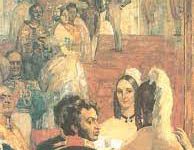The Love of Andrew the Painter
(The Love Story of Andrew the Painter)
The Love of Andrew the Painter
The Love of Andrew the Painter
Love is a mysterious power. It can add life to death and death to life. It can efface tears from the eyes and give smiles to the lips, and it is love, which sometimes can efface smiles and beget a shower of tears to the eyes. Fortunate are they to whom love becomes a source of a smile instead of tears and unfortunate are they to whom love becomes a source of tears instead of smiles. Fortunate were Leo-da-Vinci; Michel Angelo, Raphael and so few—because love had been a vital source of inspiration for their creativity. But there was a younger contemporary of them to whom love had been an eternal source of tears, sorrows, sufferance and at last death. The name of that unfortunate person was Andrew. He was, like Vinci, Angelo and Raphael, an Italian painter of the 15th century. He had all the promises of becoming a great painter like his elder contemporaneous painters. But a matter of regret is that when he was on the way to achieving greatness he fell in love and married a prostitute who later on caused a fatal downfall to his career as a painter and drove him to death through sorrow and sufferance.
This painter, Andrew, with the visible promise of a great career, was born in 1486 in Italy in a very poor family. His father was a tailor and he hardly could maintain his family with the little income earned by tailoring. From his childhood, Andrew seemed to be curious to know things and matter and observing his curiosity his father had him a little schooling till he was seven years old. Though the boy wished to have further schooling, yet his father took him away from school and sent him to a goldsmith as an apprentice. But the boy could hardly learn the work of gold-smithy—because he seemed often indifferent to his job and most of his hours he liked to spend drawing pictures either on the soil or on the waste paper or on the leaves of banana. But the snake knows the snake. One day a man, by the name of Barille—who was a minor painter—came across the boy and observed his scratchings. He rightly caught the promise of the skilled probability of a painter in him. So he took Andrew away from the goldsmith’s workshop and began to keep him under his partnership and set him to draw pictures and paint attentively.
Thus under Barille’s patronage, Andrew spent three years and learned a primary knowledge of painting from him. When his patron noticed the opening of a bright career, he sent Andrew to a famed studio under Kasimo. There, by dint of his perseverance, he learned a lot and achieved superiority over his classmates. Then his name as a young painter began to be spread here and there.
In the middle ages, there had been a practice of decorating the church walls with beautiful paintings. The famed painters were engaged in such work. Gradually, Andrew had to draw the attention of the church officials and one day he succeeded to have an offer of taking the work of painting a church wall. With the passing of time, he became well famed as a young painter and took the work of painting as his profession. During the middle ages, upper-class people had led a life of extreme comfort, fashion and luxury. They had their private churches and houses decorated with beautiful paintings and they spent a huge amount of money after that. By means of this profession, Andrew began to earn a good amount of money and began to maintain his parents’ happiness.
Then, as he reached adolescence, the fire of amorous love began to burn both his body and heart. He began to dream of his darling. Already many young girls had become desirous of having him as their husband as Andrew’s name as a skilled painter had been established. With a hope to enter into marriage, or becoming his beloved, some girls had come forward to him and implored his love. But when the fishes are in abundance the fowl forgets to catch the right prey, so was what happened to Andrew. Under the pressure of the sense of amorous love, he failed to select the beloved suited to him. He began to run after beauty and had lost his sense of sound judgment. One day he suddenly met a very beautiful girl in the city of Florence. To his eyes, he was as beautiful as Cleopatra or Helen. He began to love her. She also took the avail of his love and began to show her love to him. The love deepened and one day he took her as his wife. After having taken her as his wife, he happened to know that she was a widow and was accustomed to a very wayward licentious life. He regretted but he could not draw away his love from her. She also showed her best to keep him drowned in her. The name of this woman was Mrs. Lueregia. When the news of this marriage spread in the city all his friends, admirers and relatives began to hate him instead of showing the love and respect that he used to receive before marriage. Being deprived of affection, love and honour, Andrew began to feel ashamed of his hasty marriage. He began to repent his foolishness. But what has happened cannot be made unhappened. He had already gone to the sway of Lueregia. Day by day Lueregia became obstinate, cruel to her husband. He had been compelled to act in accordance with her direction and whims. Andrew had to cease to maintain his poor parents and instead he was compelled to provide accommodation to the parents of Lueregia. Andrew day by day seemed to be indifferent to his devotion to the art of painting and began to lose his spirit. He seemed to be the slave of his wife. The beauty of Mrs. Lueregia Andriew began to engulf his career. Though Andrew earned a good amount of money in proportion to his work, yet he had to remain in misery as almost all his earnings went to the hand of Lueregia and she began to spend the earnings after fashion and comforts. One day, after the counsel of some friends of Andrew, he sent two of his paintings to the court of the king of France. The two paintings could draw the attention of the king and send for him to the royal court. Already, Andrew had begun to come to the consciousness of his lost spirit and while he got the invitation of the king of France he took the opportunity of it and leaving Lueregia in Italy, he set out for France.
King Francis welcomed him with a warm heart and gave him worthy honour and provided him with food and lodging. Andrew, after the lapse of some years, got the proper environment to pursue the art of painting and in the court of the French king, he devoted to his creativity with much attention and freedom. A good artist got his patron. Andrew became able to spread his name again not at home but abroad. The king had been paying him good remuneration and Andrew kept sending his earnings to his wife and with the money sent by Andrew, she began to lead a more wild, luxuriant and licentious life in the city of Florence. She again began the life of a prostitute. Like the swamp of bees, the young men of the city of Florence began to suck the honey and beauty in her.
One day, all of a sudden, Andrew, received a letter from Lueregia in which she wrote, pretending to be mad of him, to come back to her as soon as he would receive the letter. With the permission of the king of France, Andrew came back to Italy. The generous king presented him with a large amount of money and requested him to come back soon. The king gave him some additional money in order to buy some famous paintings of the other painters of Italy for the king. Andrew promised to keep up the words of the king.
Coming back to his motherland, Italy, Andrew again was entrapped by his wife. The money given by the king flew away within a few months and again Andrew fell into misery. He wanted to go to France again as he promised, but Lueregia in no way, allowed him to leave her.
A woman is a mysterious source of power that can either be a source of inspiration for great creation or be a cause of pathetic ruin. So Lueregia became Andrew. Her behaviour and conduct toward Andrew began to deviate from the course of his career. He again lost his spirit, but he could not sit idle. To maintain his family he had to continue his job of painting but through much mental suffering. While Andrew sat to paint at deep night in front of his table in the light of a candle, then Lueregia went out to give her company to her paramours. Andrew could say nothing, he had to see and suffer.
The honesty of the husband and the chastity of the wife is a fundamental necessary condition to keep married life happy and peaceful. The breach of it brings in sorrow and suffering. The break of chastity of a wife is even more fatal to a family that multiplies chaos every day that can turn heaven into hell.
Andrew began to grow older more swiftly before his age. One day he fell ill. In his ill bed, he desired to paint a picture of his wife, Lueregia and hence requested her to keep herself near Andrew’s bed. But Lueregia, still a lively woman, could not keep her steady for a moment. Day by day Andrew’s health and spirit began to deteriorate and on the other hand, his wife Lueregia began to enjoy more freedom and a more licentious life and at last one night the soul of Andrew went out of his body and he died pathetically. 0 0 0
The Love of Andrew the Painter
N.B. The article ‘The Love of Andrew the Painter’ originally belongs to the book ‘Love of Reputed Persons‘ by Menonim Menonimus. The Love of Andrew the Painter
The Love of Andrew the Painter
Books of Composition by M. Menonimus:
- Advertisement Writing
- Amplification Writing
- Note Making
- Paragraph Writing
- Notice Writing
- Passage Comprehension
- The Art of Poster Writing
- The Art of Letter Writing
- Report Writing
- Story Writing
- Substance Writing
- School Essays Part-I
- School Essays Part-II
- School English Grammar Part-I
- School English Grammar Part-II..
Books of S. Story by M. Menonimus:
Related Search:
- 25 Best Love Quotes
- Greatest Real-Life Love Stories
- Psychology of Love
- Beautifully Written Love Stories
- The Secret Lives of Writers











